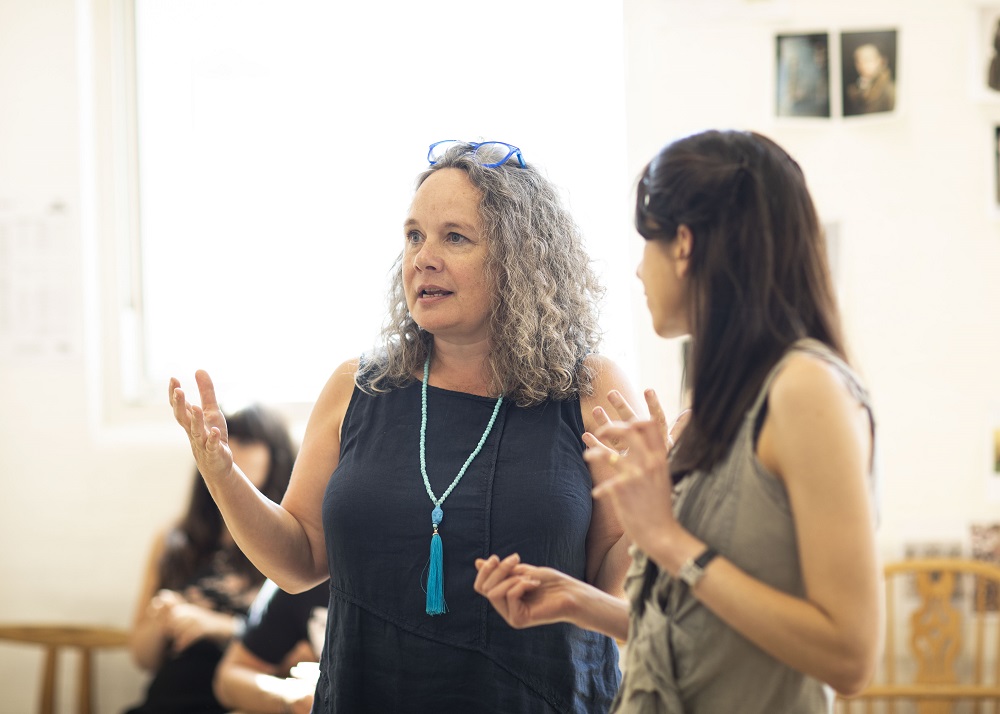Charlotte Jones: ‘Plays come from your scar tissue’ | reviews, news & interviews
Charlotte Jones: ‘Plays come from your scar tissue’
Charlotte Jones: ‘Plays come from your scar tissue’
The playwright introduces 'The Meeting', her new play for Chichester Festival Theatre

I think it’s always a dangerous sport to try and consciously unravel where your ideas come from. Lest you break the spell and inadvertently silence yourself…
There’s always the superficial reasons, of course: the geography and the history of a play. My new play The Meeting, which opens at the Minerva Theatre in Chichester this month, came from my experience of attending a Friends’ Meeting House in Lewes. I didn’t go to a Quaker Meeting in order to research and write a play. I went because I was seeking something for myself, for my life. Silence, possibly. Meaning, certainly. My children were very young and I was craving some space for myself. I felt at a low ebb as a playwright – I had had my big hit (Humble Boy) and I was chasing another. I was starting to write for TV and radio – and I was enjoying the relative invisibility of those mediums compared to the raw exposure of a theatre press night. I had moved out of London and my focus was on my family life. I began to think that I would never write another theatre play.
I grew up in the Roman Catholic Church – the daughter of an Irish immigrant mother, I was educated at a convent by nuns from when I was four till I was 18. The Liturgy of the Word runs in my bloodstream. When I left school, I spectacularly turned my back on the Church. For I had found a new religion – the theatre. I remember talking about this with the director John Caird, whose father was a celebrated theologian. He said sitting in a dark theatre for days during the technical rehearsal, collectively willing the production to come together, can feel like a dark night of the soul. There is rite and ritual aplenty. And on some level we are all seeking transcendence. (Pictured below: Charlotte Jones in rehearsal for The Meeting with director Natalie Abrahami. Image by Helen Maybanks) Opposite the Roman Catholic Church I attended throughout my childhood there was a Quaker Meeting House. It had a beautiful garden. My mother told me it was a cult but I was still drawn to it. It took me 43 years to enter a Quaker Meeting House and, to my surprise, what I discovered there reawakened my love of theatre. Quakers worship in silence until they are moved “by the Spirit” to speak. You are encouraged to weigh your words carefully. “Discernment” is key. At one of my first Meetings an elderly man sitting next to me stood up and announced simply that he was dying but that he had no fear of death and he was grateful, in the absence of any living relatives, for the tender love and care he had found here in the Quaker Meeting. When he sat down, I noticed that the quality of the silence in the room changed utterly. It was like one of those great moments in theatre where an actor achieves a level of truth that the audience instinctively recognise. “You could hear a pin drop,” we tend to say in theatrical parlance. The Quakers call it a “gathered silence”.
Opposite the Roman Catholic Church I attended throughout my childhood there was a Quaker Meeting House. It had a beautiful garden. My mother told me it was a cult but I was still drawn to it. It took me 43 years to enter a Quaker Meeting House and, to my surprise, what I discovered there reawakened my love of theatre. Quakers worship in silence until they are moved “by the Spirit” to speak. You are encouraged to weigh your words carefully. “Discernment” is key. At one of my first Meetings an elderly man sitting next to me stood up and announced simply that he was dying but that he had no fear of death and he was grateful, in the absence of any living relatives, for the tender love and care he had found here in the Quaker Meeting. When he sat down, I noticed that the quality of the silence in the room changed utterly. It was like one of those great moments in theatre where an actor achieves a level of truth that the audience instinctively recognise. “You could hear a pin drop,” we tend to say in theatrical parlance. The Quakers call it a “gathered silence”.
And so out of the silence I started to find my voice again. I have written this play slowly. I have turned to it as a refuge from the rigours of dealing with noisy script executives in TV and film meetings. I have let it grow at its own pace and with no expectation of a production. During the play’s long distillation I had a spinal injury that caused painful neuropathy in my hands. It became difficult to type. I kept going for The Meeting. I found I had no choice but to do so. Like many of my female contemporaries, it has been my experience that it is harder for us to be produced and harder to be heard. All that has gone into the writing. And that’s where plays really come from, I think: from your scar tissue, from the deep, dark wounds that unconsciously drive you. And as hard as it sometimes is, it is still a privilege to make this my work. Quakers have a testimony to truth in the same way as artists do. And audiences. For ultimately the truth is what sets us all free.
- The Meeting at Chichester Festival Theatre’s Minerva Theatre from 13 July to 11 August
- More First Person articles on theartsdesk
Share this article
The future of Arts Journalism
You can stop theartsdesk.com closing!
We urgently need financing to survive. Our fundraising drive has thus far raised £49,000 but we need to reach £100,000 or we will be forced to close. Please contribute here: https://gofund.me/c3f6033d
And if you can forward this information to anyone who might assist, we’d be grateful.

Subscribe to theartsdesk.com
Thank you for continuing to read our work on theartsdesk.com. For unlimited access to every article in its entirety, including our archive of more than 15,000 pieces, we're asking for £5 per month or £40 per year. We feel it's a very good deal, and hope you do too.
To take a subscription now simply click here.
And if you're looking for that extra gift for a friend or family member, why not treat them to a theartsdesk.com gift subscription?
more Theatre
 Wendy & Peter Pan, Barbican Theatre review - mixed bag of panto and comic play, turned up to 11
The RSC adaptation is aimed at children, though all will thrill to its spectacle
Wendy & Peter Pan, Barbican Theatre review - mixed bag of panto and comic play, turned up to 11
The RSC adaptation is aimed at children, though all will thrill to its spectacle
 Hedda, Orange Tree Theatre review - a monument reimagined, perhaps even improved
Scandinavian masterpiece transplanted into a London reeling from the ravages of war
Hedda, Orange Tree Theatre review - a monument reimagined, perhaps even improved
Scandinavian masterpiece transplanted into a London reeling from the ravages of war
 The Assembled Parties, Hampstead review - a rarity, a well-made play delivered straight
Witty but poignant tribute to the strength of family ties as all around disintegrates
The Assembled Parties, Hampstead review - a rarity, a well-made play delivered straight
Witty but poignant tribute to the strength of family ties as all around disintegrates
 Mary Page Marlowe, Old Vic review - a starry portrait of a splintered life
Tracy Letts's Off Broadway play makes a shimmeringly powerful London debut
Mary Page Marlowe, Old Vic review - a starry portrait of a splintered life
Tracy Letts's Off Broadway play makes a shimmeringly powerful London debut
 Little Brother, Soho Theatre review - light, bright but emotionally true
This Verity Bargate Award-winning dramedy is entertaining as well as thought provoking
Little Brother, Soho Theatre review - light, bright but emotionally true
This Verity Bargate Award-winning dramedy is entertaining as well as thought provoking
 The Unbelievers, Royal Court Theatre - grimly compelling, powerfully performed
Nick Payne's new play is amongst his best
The Unbelievers, Royal Court Theatre - grimly compelling, powerfully performed
Nick Payne's new play is amongst his best
 The Maids, Donmar Warehouse review - vibrant cast lost in a spectacular-looking fever dream
Kip Williams revises Genet, with little gained in the update except eye-popping visuals
The Maids, Donmar Warehouse review - vibrant cast lost in a spectacular-looking fever dream
Kip Williams revises Genet, with little gained in the update except eye-popping visuals
 Ragdoll, Jermyn Street Theatre review - compelling and emotionally truthful
Katherine Moar returns with a Patty Hearst-inspired follow up to her debut hit 'Farm Hall'
Ragdoll, Jermyn Street Theatre review - compelling and emotionally truthful
Katherine Moar returns with a Patty Hearst-inspired follow up to her debut hit 'Farm Hall'
 Troilus and Cressida, Globe Theatre review - a 'problem play' with added problems
Raucous and carnivalesque, but also ugly and incomprehensible
Troilus and Cressida, Globe Theatre review - a 'problem play' with added problems
Raucous and carnivalesque, but also ugly and incomprehensible
 Clarkston, Trafalgar Theatre review - two lads on a road to nowhere
Netflix star, Joe Locke, is the selling point of a production that needs one
Clarkston, Trafalgar Theatre review - two lads on a road to nowhere
Netflix star, Joe Locke, is the selling point of a production that needs one
 Ghost Stories, Peacock Theatre review - spirited staging but short on scares
Impressive spectacle saves an ageing show in an unsuitable venue
Ghost Stories, Peacock Theatre review - spirited staging but short on scares
Impressive spectacle saves an ageing show in an unsuitable venue
 Hamlet, National Theatre review - turning tragedy to comedy is no joke
Hiran Abeyeskera’s childlike prince falls flat in a mixed production
Hamlet, National Theatre review - turning tragedy to comedy is no joke
Hiran Abeyeskera’s childlike prince falls flat in a mixed production

Add comment